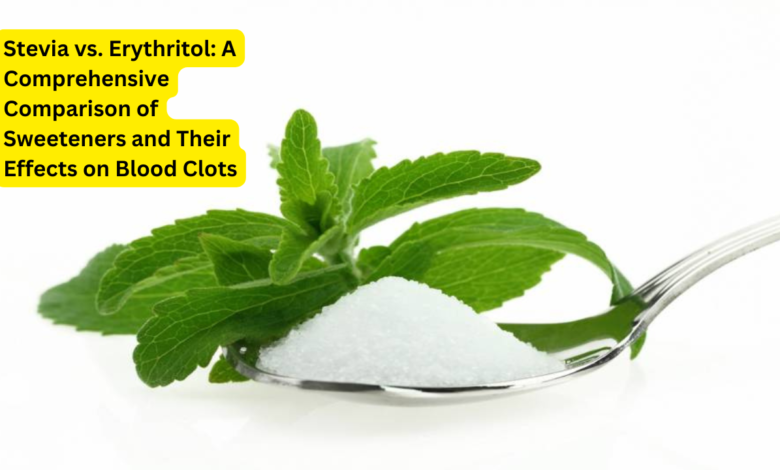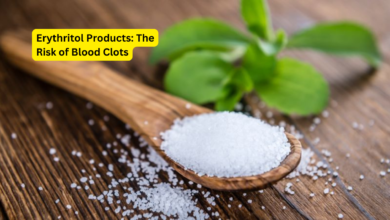Stevia vs. Erythritol: A Comprehensive Comparison of Sweeteners and Their Effects on Blood Clots

Stevia vs. Erythritol: A Comprehensive Comparison of Sweeteners and Their Effects on Blood Clots, In recent times, the debate over the health impacts of various sweeteners has gained significant attention. One particularly intriguing comparison involves erythritol, a common sweetener found in stevia and keto products, versus traditional sugar. A recent study has highlighted that drinks containing erythritol may increase the risk of blood clots, a potential concern not observed with sugar water. This article delves into the details of this study, exploring the implications for health, and examining the roles of stevia and erythritol in the broader context of dietary choices.
Understanding Stevia and Erythritol
Stevia is a natural sweetener derived from the leaves of the Stevia rebaudiana plant. It is well-regarded for its zero-calorie content and ability to provide sweetness without affecting blood sugar levels. Stevia’s appeal is particularly strong among individuals managing diabetes or those following low-carb diets.
Erythritol, on the other hand, is a sugar alcohol used as a low-calorie sweetener. It occurs naturally in some fruits and fermented foods but is typically manufactured in larger quantities for commercial use. Like stevia, erythritol has minimal impact on blood glucose levels and is often used in keto-friendly and sugar-free products.
The Study: Erythritol and Blood Clots
The study in question compared the health effects of drinks sweetened with erythritol versus sugar water. It was found that erythritol consumption was associated with a higher risk of blood clots, a concerning finding given its popularity as a sugar substitute. This risk was not observed with sugar water, suggesting that the effects of erythritol might differ significantly from those of traditional sugar.
How Erythritol May Contribute to Blood Clot Risk
Blood clotting is a complex physiological process involving platelets and clotting factors in the blood. When these elements become overly activated, they can lead to the formation of dangerous clots that might cause cardiovascular events such as heart attacks or strokes. The mechanism by which erythritol may contribute to blood clotting is still under investigation, but several theories exist.
One hypothesis is that erythritol may influence the body’s clotting mechanisms or interact with blood components in a way that promotes clot formation. This potential effect raises questions about the long-term safety of erythritol, especially for individuals at risk for cardiovascular conditions.
The Role of Stevia in Comparison
Unlike erythritol, stevia does not appear to have the same impact on blood clot risk. Stevia has been studied for various health effects, and while some research suggests it might influence blood pressure or glucose levels, there is no strong evidence linking it to increased clotting risk. This makes stevia a potentially safer option for individuals concerned about cardiovascular health while still seeking a sugar substitute.
Health Implications and Dietary Choices
For those evaluating their sweetener options, the choice between stevia and erythritol may come down to personal health considerations and taste preferences. Given the current evidence, stevia may offer a lower risk profile concerning blood clot formation compared to erythritol. However, it is essential to consider individual health conditions and consult healthcare professionals when making dietary choices.
The Broader Context: Sweeteners and Cardiovascular Health
This comparison between erythritol and stevia is part of a broader discussion on sweeteners and cardiovascular health. While many people turn to low-calorie sweeteners to avoid the adverse effects of sugar, such as weight gain and diabetes, it is crucial to consider how these alternatives affect overall health.
Sweeteners like stevia and erythritol are often marketed as healthier choices, but as research evolves, their long-term effects on health need to be carefully monitored. Consumers should remain informed and cautious, balancing the benefits of reduced calorie intake with potential health risks.
Future Research Directions
Future research should continue to explore the impact of various sweeteners on health, particularly concerning their long-term effects. Studies should aim to clarify the mechanisms through which erythritol and similar sweeteners might affect blood clotting and other aspects of cardiovascular health. Additionally, research into the health impacts of natural sweeteners like stevia should be ongoing to ensure that they remain a safe option for those seeking alternatives to sugar.
Conclusion
In summary, the debate between stevia and erythritol as sweeteners underscores the importance of informed dietary choices. While erythritol has been linked to an increased risk of blood clots in recent studies, stevia appears to offer a safer alternative for those concerned about cardiovascular health. As always, staying updated with the latest research and consulting with healthcare providers will help individuals make the best choices for their personal health.





5 Comments